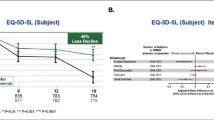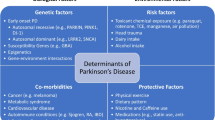Abstract
Our objective was to explore interest in genetic testing among Ashkenazi Jewish (AJ) Parkinson’s Disease (PD) cases and first-degree relatives, as genetic testing for LRRK2 G2019S is widely available. Approximately 18 % of AJ PD cases carry G2019S mutations; penetrance estimations vary between 24 and 100 % by age 80. A Genetic Attitude Questionnaire (GAQ) was administered at two New York sites to PD families unaware of LRRK2 G2019S mutation status. The association of G2019S, age, education, gender and family history of PD with desire for genetic testing (outcome) was modeled using logistic regression. One-hundred eleven PD cases and 77 relatives completed the GAQ. Both PD cases and relatives had excellent PD-specific genetic knowledge. Among PD, 32.6 % “definitely” and 41.1 % “probably” wanted testing, if offered “now.” Among relatives, 23.6 % “definitely” and 36.1 % “probably” wanted testing “now.” Desire for testing in relatives increased incrementally based on hypothetical risk of PD. The most important reasons for testing in probands and relatives were: if it influenced medication response, identifying no mutation, and early prevention and treatment. In logistic regression, older age was associated with less desire for testing in probands OR = 0.921 95%CI 0.868–0.977, p = 0.009. Both probands and relatives express interest in genetic testing, despite no link to current treatment or prevention.




Similar content being viewed by others
References
Alcalay, R. N., Mirelman, A., Saunders-Pullman, R., Tang, M. X., Mejia Santana, H., Raymond, D., & Marder, K. S. (2013). Parkinson disease phenotype in Ashkenazi Jews with and without LRRK2 G2019S mutations. Movement Disorders, 28(14), 1966–1971. doi:10.1002/mds.25647.
Clark, L. N., Wang, Y., Karlins, E., Saito, L., Mejia-Santana, H., Harris, J., . . . Marder, K. (2006). Frequency of LRRK2 mutations in early- and late-onset Parkinson disease. Neurology, 67(10), 1786–1791. doi: 01.wnl.0000244345.49809.36 [pii] 10.1212/01.wnl.0000244345.49809.36
Dahodwala, N., Connolly, J., Farmer, J., Stern, M. B., Jennings, D., & Siderowf, A. (2007). Interest in predictive testing for Parkinson’s disease: impact of neuroprotective therapy. Parkinsonism & Related Disorders, 13(8), 495–499. doi:10.1016/j.parkreldis.2007.02.010.
Falcone, D. C., Wood, E. M., Xie, S. X., Siderowf, A., & Van Deerlin, V. M. (2011). Genetic testing and Parkinson disease: assessment of patient knowledge, attitudes, and interest. Journal of Genetic Counseling, 20(4), 384–395. doi:10.1007/s10897-011-9362-0.
Giladi, N., Mirelman, A., Thaler, A., Bar-Shira, A., Gurevich, T., & Orr-Urtreger, A. (2011). Fighting the risk of developing Parkinson’s disease; clinical counseling for first degree relatives of patients with Parkinson’s disease. Journal of the Neurological Sciences, 310(1–2), 17–20. doi:10.1016/j.jns.2011.06.005.
Goldwurm, S., Tunesi, S., Tesei, S., Zini, M., Sironi, F., Primignani, P., & Pezzoli, G. (2011). Kin-cohort analysis of LRRK2-G2019S penetrance in Parkinson’s disease. Movement Disorders, 26(11), 2144–2145. doi:10.1002/mds.23807.
Hughes, A. J., Daniel, S. E., Kilford, L., & Lees, A. J. (1992). Accuracy of clinical diagnosis of idiopathic Parkinson’s disease: a clinico-pathological study of 100 cases. Journal of Neurology, Neurosurgery, and Psychiatry, 55(3), 181–184.
Kachergus, J., Mata, I. F., Hulihan, M., Taylor, J. P., Lincoln, S., Aasly, J., & Toft, M. (2005). Identification of a novel LRRK2 mutation linked to autosomal dominant parkinsonism: evidence of a common founder across european populations. American Journal of Human Genetics, 76(4), 672–680.
Marder, K., Levy, G., Louis, E. D., Mejia-Santana, H., Cote, L., Andrews, H., & Ottman, R. (2003). Accuracy of family history data on Parkinson’s disease. Neurology, 61(1), 18–23.
Orr-Urtreger, A., Shifrin, C., Rozovski, U., Rosner, S., Bercovich, D., Gurevich, T., & Giladi, N. (2007). he LRRK2 G2019S mutation in Ashkenazi Jews with Parkinson disease: is there a gender effect? Neurology, 69(16), 1595–1602. doi:10.1212/01.wnl.0000277637.33328.d8.
Oster, E., Dorsey, E. R., Bausch, J., Shinaman, A., Kayson, E., Oakes, D., … Huntington Study Group, Pharos Investigators. (2008). Fear of health insurance loss among individuals at risk for Huntington disease. American Journal of Medical Genetics. Part A, 146(16), 2070–2077. doi:10.1002/ajmg.a.32422.
Sakanaka, K., Waters, C. H., Levy, O. A., Louis, E. D., Chung, W. K., Marder, K. S., & Alcalay, R. N. (2013). Knowledge of and interest in genetic results among Parkinson disease patients and caregivers. Journal of Genetic Counseling. doi:10.1007/s10897-013-9618-y.
Sidransky, E., Nalls, M. A., Aasly, J. O., Aharon-Peretz, J., Annesi, G., Barbosa, E. R., & Ziegler, S. G. (2009). Multicenter analysis of glucocerebrosidase mutations in Parkinson’s disease. The New England Journal of Medicine, 361(17), 1651–1661.
Struewing, J. P., Hartge, P., Wacholder, S., Baker, S. M., Berlin, M., McAdams, M., & Tucker, M. A. (1997). The risk of cancer associated with specific mutations of BRCA1 and BRCA2 among Ashkenazi Jews. The New England Journal of Medicine, 336(20), 1401–1408.
Tan, E. K., & Jankovic, J. (2006). Genetic testing in Parkinson disease: promises and pitfalls. Archives of Neurology, 63(9), 1232–1237. doi:10.1001/archneur.63.9.1232.
Trinh, J., Amouri, R., Duda, J. E., Morley, J. F., Read, M., Donald, A., . . . Farrer, M. J. (2014. A comparative study of Parkinson’s disease and leucine-rich repeat kinase 2 p.G2019S parkinsonism. Neurobiol Aging 35(5); 1125-1131. doi: 10.1016/j.neurobiolaging.2013.11.015
Acknowledgments
This study was supported by the Michael J Fox Foundation, NIH (R56NS036630, NS050487, NS060113, UL1 TR000040, and 10628097) and the Parkinson’s Disease Foundation.
Disclosure
Manisha Gupte MD, Helen Mejia Santana MS, Anat Mirelman PhD, Deborah Raymond MS, Avi Orr-Urtreger MD PhD, Nir Giladi MD report nothing to disclose.
Dr. Alcalay receives research support from the NIH (K02NS080915), the Parkinson’s Disease Foundation, the Smart Foundation and the Michael J Fox foundation.
Dr. Saunders-Pullman serves on the Scientific Advisory Board of the Dystonia Medical Research Foundation. She receives research support from the NIH (K02 NS073836), the Michael J Fox Foundation for Parkinson’s Research, the Bachmann-Strauss Dystonia and Parkinson’s Foundation, and the Marcled Foundation.
Dr. Ozelius receives salary support from NIH [NS037409, NS075881, DC011805]. She is a current member of the scientific advisory boards of the National Spasmodic Dysphonia Association, the Benign Essential Blepharospasm Research Foundation and Tourette Syndrome Association, Inc. Dr. Ozelius receives royalty payments from Athena Diagnostics related to patents.
Dr. Clark receives research support from the NIH [NINDS #R01 NS060113 (principal investigator), NINDS #R01 NS073872 (Co-principal investigator), NIA #5P50AG008702 (Project 3, principal investigator), and NINDS #NS036630 (co-investigator) and 2P50NS038370-11 (Co-Investigator)], and the Parkinson’s Disease Foundation (principal investigator) and the Michael J Fox Foundation (co-investigator).
Dr. Bressman serves on the advisory boards of the Michael J. Fox Foundation, the Dystonia Medical Research Foundation, the Bachmann Strauss Dystonia and Parkinson’s Foundation, and the Board of We Move. She has consulted for Bristol Meyer Squibb. She has received research support from the Michael J. Fox Foundation, National Institutes of Health (NIH), and Dystonia Medical Research Foundation.
Dr. Marder receives research support from the NIH [#NS036630 (PI), 1UL1 RR024156-01 (Director PCIR), PO412196- G (Co-I),]. She received compensation for participating on the steering committee for U01NS052592 and from the Parkinson Disease Foundation, Huntington’s Disease Society of America, the Parkinson Study Group, CHDI, and the Michael J Fox Foundation.
Conflict of Interest
Manisha Gupte, Roy N. Alcalay, Helen Mejia-Santana, Deborah Raymond, Rachel Saunders-Pullman, Ernest Roos, Martha Orbe-Reily, Ming-X Tang, Anat Mirelman, Laurie Ozelius, Avi Orr-Urtreger, Lorraine Clark, Nir Giladi, Susan Bressman and Karen Marder declare that they have no conflict of interest.
Human Studies and Informed Consent
All procedures followed were in accordance with the ethical standards of the responsible committee on human experimentation (institutional and national) and with the Helsinki Declaration of 1975, as revised in 2000 (5). Informed consent was obtained from all patients for being included in the study.
Author information
Authors and Affiliations
Corresponding author
Rights and permissions
About this article
Cite this article
Gupte, M., Alcalay, R.N., Mejia-Santana, H. et al. Interest in Genetic Testing in Ashkenazi Jewish Parkinson’s Disease Patients and Their Unaffected Relatives. J Genet Counsel 24, 238–246 (2015). https://doi.org/10.1007/s10897-014-9756-x
Received:
Accepted:
Published:
Issue Date:
DOI: https://doi.org/10.1007/s10897-014-9756-x




